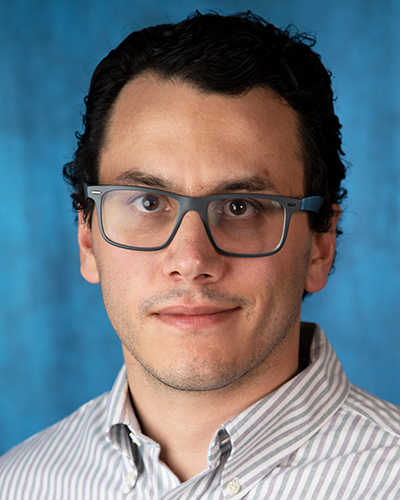Posted on September 27, 2024 by UTSA School of Data Science
Anthony Rios named new SDS Faculty Fellow

The UTSA School of Data Science (SDS) is pleased to announce that Anthony Rios, Ph.D., has been named the latest SDS Faculty Fellow. As a faculty fellow, Rios – an assistant professor of information systems and cyber security and a core faculty member with the School of Data Science – is responsible for engaging in projects that ensure the university continues to serve as a leader in data science research and education.
Rios received his Ph.D. in computer science from the University of Kentucky in 2018, where he specialized in natural language processing (NLP) and biomedical informatics. At this time UTSA was also expanding its hiring of data science faculty, and so Rios applied.
“It was basically the right place and the right time that helped me find a great fit here at UTSA,” he said.
During his time at UTSA, Rios has earned multiple prestigious awards from the U.S. National Science Foundation including the NSF Computer and Information Science and Engineering Research Initiation Initiative (CRII) and the Faculty Early Career Development Program award (CAREER). These projects allowed Rios to accelerate his research and focus on developing fair, community-driven NLP models.
Of course, it wasn’t pure chance that landed Rios in San Antonio.
“It also helps that my wife started as faculty here in 2017, so I followed her!” he says.
Gabriela Romero Uribe, Ph.D., is a Klesse Endowed Professor and Associate professor with the Klesse College of Engineering and Integrated Design. She specializes in biomedical and chemical engineering and is herself an award-winning researcher – she earned her own CAREER award the year before Rios did.
As if being married to a chemical engineer doesn’t provide enough opportunities for interdisciplinary collaboration, Rios says he’s excited to begin as SDS Faculty Fellow and connect with students and researchers in other fields.
“This opportunity allows me to connect with multidisciplinary experts in the school better,” he said.
“Moreover, my other hat has been as the Graduate Advisor of Record for the Master’s in Data Analytics (MSDA) program. This new role will allow me to have an impact on students interested in data science beyond the MSDA and provide even better opportunities to the students.”
One of the projects Rios is most looking forward to working on is the so-called “Headache Board,” a collaboration with Federal IT Consulting (FEDITC), a national IT and cybersecurity firm. This headache board serves as a way for companies to post projects or problems in need of solutions, and furnishes a monetary incentive for students to develop solutions on their own time. The program is currently being piloted in the Artificial Intelligence, data analytics, and statistics and data science master’s programs.
“This initiative will allow us to our students with real world problems for better experiential learning and will provide financial benefits for the students if their work can have an impact on the companies that post to the board,” Rios said.
During his initial tenure as Faculty Fellow, Rios says he looks forward to further exploring the fundamental limitations of language and computational processing. He believes that understanding how and why NLP models fail is an essential first step to improving their reasoning abilities and could result in a variety of important implications in data science research and practices.
On a more human level, Rios is also interested in working to overcome the barriers that many students face when it comes to entering the world of data science.
“I believe that data science has a place for everyone,” he said. “Students from all backgrounds and with various technical expertise can succeed in the field. However, many students can be put off by some of the technical requirements in the field.”
While Rios concedes there’s no easy fix, he remains convinced that data science works best when approached from a variety of backgrounds and with different areas of expertise.
“I want to encourage a collaborative multidisciplinary program where students from all backgrounds, technical and otherwise,” he said.
When he’s not teaching, conducting research, or making data science more accessible to all, Rios enjoys cycling around San Antonio with other members of the UTSA community, as well as performing at local magic clubs as an amateur magician.
For more information on Rios and his work, visit https://anthonyrios.net/.


